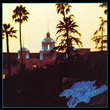| All Artists: Alexander Scriabin, Vladimir Ashkenazy, Berlin Symphony Orchestra, Deutsches Symphony Orchestra Berlin, Thomas Trotter, Alexander Guindin, Aleksei Lubimov, Anne-Kristiina Kaappola Title: Scriabin: Preparation for the Final Mystery Members Wishing: 3 Total Copies: 0 Label: Decca Release Date: 1/11/2000 Genre: Classical Styles: Opera & Classical Vocal, Chamber Music, Historical Periods, Classical (c.1770-1830), Modern, 20th, & 21st Century, Instruments, Keyboard Number of Discs: 3 SwapaCD Credits: 3 UPC: 028946632925 |
Search - Alexander Scriabin, Vladimir Ashkenazy, Berlin Symphony Orchestra :: Scriabin: Preparation for the Final Mystery
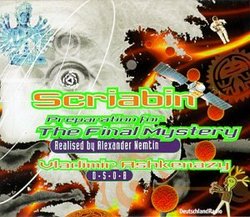 | Alexander Scriabin, Vladimir Ashkenazy, Berlin Symphony Orchestra Scriabin: Preparation for the Final Mystery Genre: Classical
Alexander Nemtin's brave realization of the "Preparation for the final mystery" (from Scriabin's magnum opus, Mysterium) enables us to hear its awe-inspiring conception in all its glory. Working from sketches, Nemtin prese... more » |
Larger Image |
CD DetailsSynopsis
Amazon.com Alexander Nemtin's brave realization of the "Preparation for the final mystery" (from Scriabin's magnum opus, Mysterium) enables us to hear its awe-inspiring conception in all its glory. Working from sketches, Nemtin presents a convincing manifestation of Scriabin's thought. The intensity of this piece is unremitting. To listen straight through is an exhausting but ultimately uplifting experience, one aided by this thoroughly committed performance from Ashkenazy and his Berlin forces. Even though the harmonic language is extremely concentrated, the progress of the work remains involving, natural, and, above all, gripping. The music is frequently hypnotic, often breathing an all-encompassing, pantheistic mysticism. The soloists, particularly the soprano Anna-Kristina Kaappola and the pianist Alexei Lubimov, are superb. The recording aptly conveys the requisite sense of space, while simultaneously allowing every detail to come through. The coupling, Nuances, comprises a selection of Scriabin's pieces orchestrated to form a ballet. Ashkenazy's performance highlights the elusive nature of this music, as in the flighty fourth movement or in the twilight world of the 12th. A treat for all fans of mature Scriabin, sumptuously recorded and expertly played and sung. --Colin Clarke Similarly Requested CDs
|
CD ReviewsA must for all lovers of Scriabin--and of the overwhelming.. Ryan Sweet | Canton, OH USA | 04/19/2000 (5 out of 5 stars) "I waited a number of months before investing in this 190 minute Scriabinfest, but I have to say I should've jumped up and bought it right away. Why? A number of reasons. First, Nemtin's job in "realizing" the nearly unrealizable fantasy of Scriabin's later years deserves credit (and a good listen) for the sheer work it must have involved: the liner notes tell us that Nemtin virtually sacrificed his own career as a composer to finish this, the most grandiose of the Master's late works, from the measly 53 pages of sketches left behind. In fact, Nemtin worked from 1971 until 1996 on this labor of love, and I have to say the results are quite overwhelming. Any lover of Scriabin will recognize the pillow-deep climaxes, the gorgeous cantabiles, the slow-motion eroticism of his later works, but with an added touch. And this added touch is the second reason to buy this recording-the work puts into perspective just where Scriabin belongs in the continuum of 20th century music. When I listened to the second and third parts of this "Prefatory Action," (the first section, "Universe," is not filled with quite the musical incident that the latter two sections have) I could hear just how far "late Scriabin" goes toward the musical language of composers who wrote long after he died in 1915. It seems as though the fleshing out of the claustrophobic atmosphere of the later pieces has resulted in a new sound altogether, a sound created by a more pointillistic approach to orchestration and a closer attention to the sounds created by the notes in collision (or by themselves, as in the massive F-sharp peroration at the end of "Transfiguration") and the quality of the notes themselves. In this sense, parts of this three-part Introduction to the Mysterium remind me of Webern, and even of Penderecki in some spots. Too, Scriabin/Nemtin's wild veering from brassy proclamations to intimate secret-telling and their sounding, at one point, of every note in the chromatic scale at once reminded me of Messiaen (cf. his Turangalila Symphonie) and of Ligeti (Atmospheres, used so memorably in Kubrick's 2001) respectively. Of course, as with some Scriabin (or any work of such vast proportions, for that matter) there are longeurs, but these are few and one's interest is generally held by the kaleidoscope of rich textures that Scriabin presents. The other work included, Nemtin's orchestrations of Scriabin's later piano works arranged into a meaningfully balletic sequence, is lovely, as well. And what about the recording itself? Well, it can handle both the massed use of the full orchestra, the wordless chorus, the soprano soloist, a piano and an organ, and still reproduce with stunning clarity the finest-spun thread of melody that Scriabin/Nemtin can weave. Of course, as with many recording done at this venue (the Jesus-Christus-Kirche in Berlin-Dahlem), the soundfield is set back a tad, but this isn't anything that a judicious fiddle with the volume knob can't control. All said, this venture is a must for all Scriabinites, but I would also recommend it to anyone interested in the music of the late-Romantic era and to anyone with a weakness for the solipsistic, the erotic, and the mystical. Get the set and revel in the experience!" How much love is it going to take? Kris De Ruysscher | Brussels, Belgium | 08/24/2004 (5 out of 5 stars) "Facts: Is this a Scriabin composition? No. Is it close to any other Scriabin composition? No, though his spirit seems to soar through it. Would he have written it like this? Impossible to give an objective answer but in my view, no. Then why buy this? Because it's probably the most intense musical experience you'll have for a long time coming. Alexander Nemtin used the 52 unnumbered pages of sketches as Scriabin left them on the table of his study when he died in 1915. Scriabin didn't write chronologically: when an idea came to his mind, he'd write it down immediately. So even a mere chronological reconstruction would seem a difficult task. Instead Nemtin chose to 'compose' a performable version of the sketches, a project that grew and grew into the massive work we have before us. That it owes more to Messiaen than to Scriabin is a minor element: you cannot omit cultural developments and you cannot confine yourself to pastiche or epigonism. Nemtin seems to have been posessed with Scriabins' holy fire and gave us (t)his work. An important fact we need to consider is the context to which Scriabin/Nemtin wrote this: it was to be the music performed to the Apocalypse (bare with me for a minute, please), with all the peoples of the world as its performers. Huge bells hanging out of zeppelins would call upon humanity to enter a new age of spiritual enlightenment (with Scriabin as the supreme being). If this sounds a wee bit overambitious, then consider the fact that Nemtin pulled it off musically. Much in the same (opposite) way Messiaen did with his Quatuor written in a Silesian war prisonner camp. Facts (bis): Is it any good? Yes, even better than that. Should I buy it? If you trust my opinion, yes. Why? Because you will feel the genuine honesty in this music. You will understand where and why Scriabin wanted to take us and you will be showered with miraculous sunlight. A must-have!" Astounding George Crossley | Deltona Fla | 04/06/2002 (5 out of 5 stars) "This massive work is the most emotionally shattering work I beieve I have ever heard. The Second "Mankind" is as dark a picture of the human race I have ever heard. Even though this work is over 150 minutes there is a definite cohesion throughout all three movements. The amazing thing is that all three movements also are stand alone in their approach. This work is simply shattering. More then one hearing will definitely be needed to get the sense of balance and cohesion in this stunning Work."
|

 Track Listings (22) - Disc #1
Track Listings (22) - Disc #1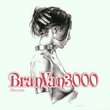
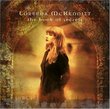
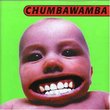

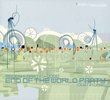


![No Need to Argue [IMPORT]](https://nationalbookswap.com/cd//m/76/4376/204376.jpg)
